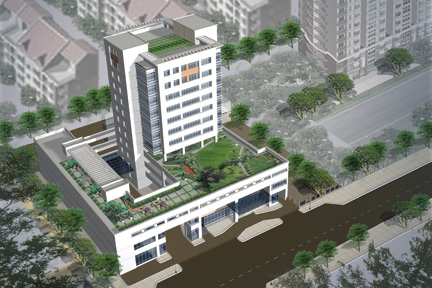A long-term partnership between the UBC Faculty of Dentistry and the National Hospital of Odonto-Stomatology in Ho Chi Minh City, Vietnam, has been established. This collaboration will advance oral health research to study oral cancer, dental caries and craniofacial birth defects. Research centre space in the national hospital—an in-kind gift to the Faculty—is valued at $8 million.
“Through collaborative research, we aim to advance oral-facial health and scientific knowledge across international boundaries,” says Dr. Charles Shuler, dean of the Faculty of Dentistry. An expanded presence of UBC Dentistry in Vietnam increases the quality and impact of its research and scholarship, and underscores the Faculty as a world leader in knowledge exchange and mobilization, he adds.

The UBC Dentistry & National Hospital of Odonto- Stomatology Oral Health Research Centre will provide a dynamic hub for education, research and knowledge transfer. The 1,200-square-metre (12,916 sq. ft.) facility is on the fourth floor of the national hospital.
The centre will facilitate the transfer of knowledge to local and international researchers, to raise the baseline of oral health care in Vietnam and Southeast Asia, increasing the local capacity to treat their most pressing oral health issues (see sidebar).
The partnership is a game changer for global health research and education. The oral health research centre will increase the quality and impact of new discoveries and scholarship. see below for goals of the centre.
The Faculty of Dentistry has a long-standing history and commitment to Vietnam. Over the past decade, faculty members, general practice residents and dental students have rotated to Ho Chi Minh City to provide patient treatment and oral health education. They have treated a broad spectrum of diseases not typically seen in British Columbia—the experience subsequently benefits Canada’s multicultural dental health population.
“Our hospital is proud of co-operating with UBC,” says Dr. Lam Hoai Phuong, director of the National Hospital of Odonto-Stomatology. “It is a valuable opportunity to exchange knowledge between visiting dentistry residents, UBC faculty, Vietnamese scholars, dental students and general dentists.”
The centre officially opened on December 13, 2012. After an inaugural celebration, several UBC Dentistry scholars presented a series of seminars and lectures to their Vietnamese counterparts.
Research Areas of Oral Health Issues
Oral/Facial Oncology
Oral cancer ranks as the fifth most common cancer in the world. In Vietnam, oral malignancies of all kinds are often not detected until individuals experience debilitating compromise of normal oral functioning. Worldwide, Vietnam has the highest rate of smoking among males (63.4 percent).
Cariology
Over 80 percent of Vietnamese children suffer tooth decay. In the general population, the prevalence of caries is 67 percent; periodontal disease is 72 percent.
Developmental Biology
Approximately one in every 500 babies in Vietnam is born with a cleft lip and/or cleft palate.
Goals of the Oral Health Research Centre
- Expand familiarity with various disease processes and traumatic injuries involving the head and neck, especially with respect to pathologies of high prevalence in Asian populations.
- Reciprocate education and research development that is beneficial to both Vietnam and Canada.
- Gain competence in alternative modalities for the provision of oral health care in a less-resourced country, which can also be applied in Canada.
Support for the centre currently includes the principal in-kind donation of space from the Vietnamese national hospital and the naming of a research lab by Septodont. Further contributions for naming space in the centre, and for travel fellowships for researchers and students, are encouraged. For more information, contact Jane Merling at 604-822-5886 or Send an e-mail.
Related Items:
- Dec. 13, 2012, Media advisory: UBC Dentistry opens oral health research centre in Vietnam
- Sep. 12, 2012, UBC Public Affairs: UBC partners with Vietnamese hospital
Return to more feature stories.